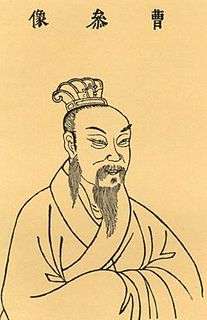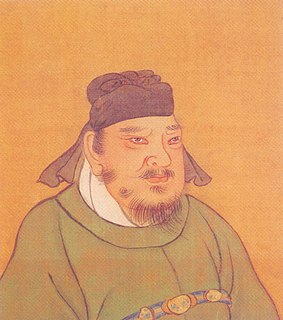 W
WCao Shen or Cao Can, courtesy name Jingbo, was a chancellor of the Western Han dynasty. He participated in the Chu–Han Contention on Liu Bang 's side and contributed greatly to the founding of the Han dynasty.
 W
WChen Ping was a Chinese politician who served as a chancellor in the early Western Han dynasty. He was an advisor to Liu Bang, the founding emperor of the Han dynasty. He played an important role in helping Liu Bang overcome his rival, Xiang Yu, in the Chu–Han Contention.
 W
WEmperor Gaozu of Han, born Liu Bang with courtesy name Ji (季), was the founder and first emperor of the Han dynasty, reigning in 202–195 BC. His temple name was "Taizu" while his posthumous name was Emperor Gao, or Gaodi; "Gaozu of Han", derived from the Records of the Grand Historian, is the common way of referring to this sovereign even though he was not accorded the temple name "Gaozu", which literally means "High Founder".
 W
WFan Kuai was a military general of the early Western Han dynasty. He was a prominent figure of the Chu–Han Contention, a power struggle for supremacy over China between the Han dynasty's founder, Liu Bang, and his rival, Xiang Yu.
 W
WFan Zeng was an adviser to the warlord Xiang Yu, who fought for supremacy with Liu Bang, the founder of the Han dynasty, during the Chu–Han Contention.
 W
WHan Xin was a Chinese military general and politician who served Liu Bang during the Chu–Han Contention and contributed greatly to the founding of the Han dynasty. Han Xin was named as one of the "Three Heroes of the early Han dynasty", along with Zhang Liang and Xiao He.
 W
WXiang Yu, born Xiang Ji (項籍), was the Ba Wang (霸王) or Hegemon-King of Western Chu during the Chu–Han Contention period of China. A noble of the Chu state, Xiang Yu rebelled against the Qin dynasty and became a prominent warlord. He was granted the title of "Duke of Lu" (魯公) by King Huai II of the restoring Chu state in 208 BC. The following year, he led the Chu forces to victory at the Battle of Julu against the Qin armies led by Zhang Han. After the fall of Qin, Xiang Yu was enthroned as the "Hegemon-King of Western Chu" (西楚霸王) and ruled a vast area covering modern-day central and eastern China, with Pengcheng as his capital. He engaged Liu Bang, the founding emperor of the Han dynasty, in a long struggle for power, known as the Chu–Han Contention, which concluded with his eventual defeat at the Battle of Gaixia and his suicide. Xiang Yu is depicted in the Wu Shuang Pu by Jin Guliang.
 W
WXiao He was a Chinese politician of the early Western Han dynasty. He served Liu Bang, the founder of the Han dynasty, during the insurrection against the Qin dynasty, and fought on Liu's side in the Chu–Han Contention against Liu's rival, Xiang Yu. After the founding of the Han dynasty, Xiao He became the chancellor and held office until his death. For his contributions, he is also known as one of the "Three Heroes of the early Han dynasty" (漢初三傑), along with Han Xin and Zhang Liang.
 W
WConsort Yu, also known as "Yu the Beauty", was the wife of the warlord Xiang Yu, who competed with Liu Bang, the founder of the Han dynasty, for supremacy over China in the Chu–Han Contention (206–202 BC).
 W
WZhang Liang, courtesy name Zifang, was a Chinese military strategist and politician who lived in the early Western Han dynasty. He is also known as one of the "Three Heroes of the early Han dynasty" (漢初三傑), along with Han Xin (韓信) and Xiao He. Zhang Liang contributed greatly to the establishment of the Han dynasty. After his death, he was honoured with the posthumous title "Marquis Wencheng" by Emperor Qianshao. Zhang Liang is depicted in the Wu Shuang Pu by Jin Guliang.